A Sorgen of care
Not many youths consider a career in the eldercare business but not Serene Tan, who has started a business selling innovating mobility aids for seniors.
BY: Gia Phua
Second-year NUS undergraduate, Serene Tan, 22, and fourth-year NUS undergraduate, Aaron Boo, 25 – are welding their way into the ageing market. The duo started Sorgen (which means care in German) in 2011, the first Singapore-based company that aims to create innovative mobility aids for seniors.
They realised that the elderly found it strenuous to lift up a conventional walking frame each time they took a step. Hence, they invented their first product series of walking frames, GlydeSafe Sleek, in 2012. Sporting with wheels, their walking frame makes it a lot easier for the elderly to handle. The walking frame idea proceeded to win multiple business innovation competitions. To date, it is being sold in over 20 healthcare partners such as Singapore General Hospital, Tan Tock Seng Hospital and Mount Elizabeth Hospital.
Ageless Online chats with Serene about starting the company that targets seniors and some of the ideas coming out:
Can you describe what made you interested in starting your own company, particularly designing assistive devices for seniors?
The idea to start my own company in senior mobility assistance arose from the opportunity to innovate. Back in my polytechnic days, I participated in an innovative business competition NTU Ideas Inc Business Challenge 2011 with a team. We identified that mobility in ageing was one of the pressing challenges for seniors in Singapore and with much brainstorming, the product idea for the walking frame was formed. After the competition was over, I felt the walking frame series was a great innovation that had the potential to be commercialised. As the product idea gained a greenlight from the judges, I decided to turn it into a real business idea. With this opportunity, Aaron and I worked on materialising the walking frame to bring it into market.
Can you describe the journey of starting up your own business?
I started the business venture on my own at the start. In the first year of business, I devoted tremendous effort in R&D and worked with product designers to create four prototypes until I developed a minimum viable product for testing. However, I realised that a prototype and a market product are vastly different in sleekness, warranty and material. Eventually, I managed to source for a manufacturer who could handle both design and manufacturing for my products. Continuously, I reached out to more than 20 physiotherapists in Singapore to test and approve the walking frames. I have been very fortunate to have met and received help from several unexpected people who were simply glad to see me succeed in my journey.
In 2012, I was introduced to Aaron who was studying Mechanical Engineering in NUS. He helped me with more revisions of the prototypes. It was then I discovered he is very proficient in product design, so I asked him to join me in my company.
Was your family supportive of your efforts?
My parents have been generally supportive. Initially, my dad was not convinced. Things took a turn when he accompanied me to personally meet the manufacturer in Fuzhou (China) factory, spoke to the manufacturer and witnessed everything for himself. He saw my commitment and realised everything was real. Gradually, he grew more convinced and offered to support me in marketing my products overseas.
How did the idea for your product series of walking frames, GlydeSafe, came about?
In my observations of seniors, I realised they strenuously lift up their walking frames and land before taking the next step. I thought this could be vastly improved so hence GlydeSafe came about. Aaron came on board with me to design the products.
It is a series of walking frames that completely eliminates the need for seniors to lift the frames up when they are walking forward. It has wheels attached to the bottom of the frame and works by a simple glide movement. In consideration of the safety aspect, a fully responsive auto-brake system is in place so every step is supported and made effortless.
Our second product series, the GlydeSafe Travel, is aimed at solving the problem of seniors having difficulty finding seats outdoors. GlydeSafe Travel is a walking frame with a retractable seat that seniors can pull out and sit on when they get tired. It is ideal for those who want to travel outdoors.
Are there other existing local companies that manufacture similar products as you are?
There are definitely competitors who are selling walking frames, but what is valuable about our invention of GlydeSafe is the patented detachable wheel for walking frames. No competitors have the patent to produce this innovative walking frame with wheels.
What has been the response so far in terms of the usability of your products?
The acceptance of our products has been positive in hospitals. We have partnered with more than 24 organisations to carry our products at their rehabilitation centres. Apart from this, we have approached several distributors, who are now doing marketing sales for our products in Singapore and Australia.
Can you describe your experience working with seniors during your test trials?
It was quite a challenge for me as I cannot speak dialect and, with the guidance of physiotherapists, I had to teach the seniors how to use it. Nonetheless it was a great and rewarding experience seeing how the seniors responded to the new product.
Is hospital collaborations your main channel to move sales?
Yes. I work with distributors to bring my products into the hospitals. My main sales movement is through hospital shelves as doctors prescribe the aid directly to patients to get the frames from hospitals. Currently, I am not yet collaborating with pharmacies such as Guardian and Watsons, because they have high listing fees.
How much do your products cost?
The GlydeSafe Sleek walking frame is selling at S$99, while the GlydeSafe Travel walking frame with a retractable seat is selling at S$120. At the moment, I am trying to attain the Senior Mobility Fund, under the Agency of Integrated Care (AIC), which subsidises products under its listing for lower-income patients.
How many units have you sold in Singapore, as well as overseas?
I have sold around 140 sets of GlydeSafe Sleek and GlydeSafe Travel in total – 100 sets in Singapore and 40 overseas. Additionally, I have donated 60 in total to St Hilda Integrated Care and Salvation Army’s Peacehaven Nursing Home.
Can your reveal how much you both have invested into the business so far?
We have forked out S$12,000 so far to match SPRING Singapore’s funding, however the sum is currently only used for business operations. SPRING Startup has funded S$50,000, Youth Business Singapore has funded an interest-free loan of S$10,000 and NUS Entrepreneurship Centre’s Innovation Practicum Grant has funded S$10,000. These organisations do not require equity stakes from me, but rather they are invested in supporting youth entrepreneurship.
There are only two of you in the company right now, and both of you are still schooling. How do you guys handle all the business operations?
I am in charge of sales and marketing, while Aaron takes care of research and product development. It has been quite manageable for me since I use the pockets of time in between schooling in NUS to work on this business. I think it is about priorities; I choose to spend less time shopping and devote more time on this.
GlydeSafe Sleek has won multiple innovation competitions. Have any investors or organisations approached you to offer funding? If there are, how do you decide whom to receive funding from?
I have received support in mentorship, incubation and funding from SPRING Singapore, NUS Enterprise, and Youth Business Singapore. I am more receptive to these organisations because they do not require equity stakes or have terms and conditions tied to it. As for investors, I would like to partner with those who can offer me the necessary resources to propel my business forward. Two private investors have approached me but I have not decided to take up their offer at the time being.
You have been doing your manufacturing in China, how has that been?
The language barrier has been my biggest hurdle so far as it is tough communicating the right technical terms with the manufacturer. How does one translate bolts and nuts in Chinese? I had to travel down to the factory personally to ensure the product design was executed properly.
So what’s next?
I plan to release a wider range of senior mobility products and bring these good innovations global. On top of that, I may want to target products beyond these, and possibly venture into technology products for the next baby boomers, who are particularly IT-savvy.
Do you have any advice for anybody who aims to start up their own eldercare business?
I guess it is important to find mentors to guide you. Raja, my local distributor, has guided me tremendously on product distribution in Singapore. Michael Pang, founder of a Singapore healthcare equipment company, is another mentor who showed me the hard work needed in polishing up a prototype to be a market-ready product. He really inspired me with his foresight on commercialising innovations.
Reflecting on the work you are doing in Sorgen, what have been some of the personal impacts on yourself?
It has taught me that the entrepreneurial journey is really not easy. Sometimes, I think of giving up but as I look at the useful products we have materialised, I cannot bear to bring it to a stop just because of distribution hurdles locally and overseas.

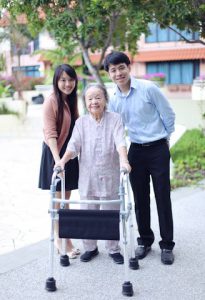
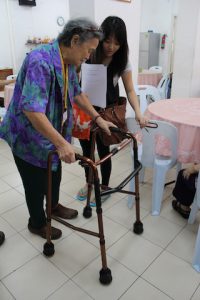
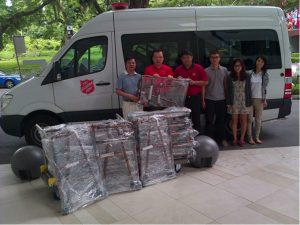
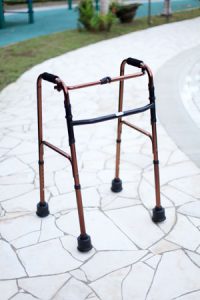
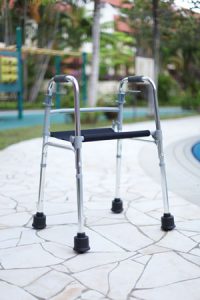
0 Comments